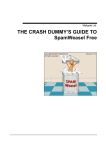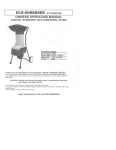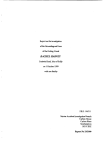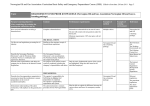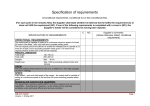Download Wiley Computing for the Older and Wiser: Get Up and Running On Your Home PC
Transcript
1 TE RI AL Introduction D MA This book is designed for people who want straightforward instructions in the use of their home computer. There are no unexplained acronyms, such as SCSI, RAM or URL, no unintelligible ‘computerspeak’ of megahertz, advanced resource management systems or graphics card drivers, and certainly no meaningless jargon. GH TE The content of the book is directed solely at PC users working with either Windows Vista Home Premium or Windows XP operating systems. Mac users are not catered for – sorry. CO PY RI You are taken gently from the act of switching the computer on and off, right through to quite sophisticated use of the Internet, email and digital photography. Each chapter is designed to expand and reinforce previous chapters and comes with a question and answer summary. Meanwhile, here are some initial considerations that may have crossed your mind. Banishing Old Beliefs Let us get a few preconceived thoughts out of the way before we go any further. Perhaps you are thinking that you are too old to start tinkering around with technology and that it should be left to students and computer geeks. Well, push that thought to one side for a moment and see if you feel the same way having read this chapter. www.pcwisdom.co.uk Computing for the Older and Wiser Knowing age is no barrier One Texan doctor began his computing career at the age of 86 and now has his own web page ten years later. My oldest client is 91 and happily sending emails to her grandchildren scattered across the globe. Your mind may be a little slower and your memory a little more elusive but if you can drive a car or use a cash machine you should be able to use a computer. Note that I did not say ‘understand’ – few of us understand the finer points of the internal combustion engine but that does not prevent us from using a car. Decreasing vision and slower reflexes may result in a road accident but you will never run anyone over with a computer. As long as your mind is active and enquiring, using a computer can expand your horizons far beyond the comfort of your own home. You will invariably feel apprehensive at the thought of new technology. My father had a brilliant mathematician’s mind but he insisted on checking the early calculators’ answers by doing it manually. It took him about three years to admit that they could be faster and occasionally more accurate. (Cash machines are simply basic computers, just like the controls of a microwave.) Personally, whenever I try to program the video recorder I risk physical damage because it appears to bear a specific grudge against me and insists on recording any television programme other than the one I had intended. My wife has no desire to use a computer and yet the video recorder obeys her every command. This is not to say that she does not recognise the benefits of computers at home – she asks me to organise things on the Internet several times a week – it’s just that she has no desire to learn computing skills, and that’s just fine. Some familiarity with the QWERTY typewriter keyboard is an advantage but touch-typing skills are not called for. I have been computing for 25 years and I still only use about four fingers and even then I get it wrong from time to time. It can be frustrating ‘hunting and pecking’ for letters and symbols but just like riding a bicycle, it comes together after a short while. After all, one thing we older members of society should have, is time. Modern computers cater for those with restricted vision and arthritic hands. Help is always to hand in the form of this book and via a simple keystroke on the keyboard. Computer screens can be magnified, print can be enlarged, and alternatives to the navigating ‘mouse’ are available that are easier on stiff fingers and 2 www.pcwisdom.co.uk Introduction wrists (see Chapter 2). There are even sound effects to warn you of impending disaster or incoming mail. All too often, you may be subjected to a vision of the younger generations’ fingers that seemingly fly across the keyboard while the screen flashes from one image to another, which quite frankly can be a little overwhelming and may be responsible for deterring their elders from ever starting to use a computer. But let us consider this, if the only cyclist you had ever seen was one riding a unicycle in a circus, you would be very hesitant to learn to ride a bike. Remember that every concert pianist initially had to master the basic scales in just the same way that every amateur playing the piano in back of the pub has to practise. It may take a little longer, but every skill demands some practise. If you fall off a bike you may land up in hospital, but if your computer crashes, you simply switch it off and make yourself a cup of tea. Sorting out gender differences The male brain is no better than the female brain – in fact, it can be a lot worse. In my experience, it can be much more difficult to teach men about computing as they often want to run before they can walk. Women, on the other hand, tend to take matters one step at a time and like to reinforce their knowledge by repetition. Men may prefer to research military history or check their investments, while women may be more interested in communication with distant families or increase their knowledge of gardening. No matter what benefits you may want from your computer you still have to master its basic use. The man in his open-top, vintage sports car and the woman in her three-door hatchback both need to have similar driving skills. Stretching the mind The main requisites for successful computing are enthusiasm and a desire to learn. If you are retired and lead a full life of social encounters, gardening, travel and engrossing hobbies then you may not have the time or the inclination to use a computer. If this is the case, put this book back on the shelf and continue enjoying yourself. A computer is not essential to a happy life. If you have the time to expand your mind and the desire to do so then a computer can be your ticket to a vast, new world of knowledge, communication and www.pcwisdom.co.uk 3 Computing for the Older and Wiser entertainment. For many older people the greatest reward is the satisfaction of acquiring a new skill. A skill that bridges the age gap between grandparents and grandchildren is one that enables the generations to explore together. Today’s busy parents often have little time or energy left at the end of a working day to help children with their homework, whereas computer-literate grandparents can provide wisdom as well as the facts. For instance, what is the population of Columbia and what are the facts concerning cocaine? Small children as young as five and under are proud to teach Grandpa their computing skills, while he enjoys their company and imparts some of his knowledge. Teenagers are another matter altogether – unless Grandma has a mind to carry a Kalashnikov against the forces of Evil. Nevertheless, a certain amount of their bizarre vocabulary will be gained from reading this book, allowing basic communication on a shared enthusiasm. In short, if you have the mind, the time and the enthusiasm to learn a new skill then this is the book for you – if not, continue to enjoy your life. Using a Home Computer The computer does not have to be connected to the outside world for it to become a valuable tool for making your life easier and more interesting. For example, home accounting programs have become very user-friendly over the past few years; secretaries of local organisations can keep accurate records of activities and membership and mail letters with just a few key strokes; instant photography in the form of digital cameras costing less than £100 has exploded; and so much more genealogy can be investigated at home. Diaries do not have to be replaced every year and telephone directories do not contain four different numbers in various writing materials leaving you wondering which one is current. Photos, CDs and other music, stamp collections and other treasured memories can be catalogued in hundreds of different ways allowing instant retrieval. Computers can play your music or you can tune in to thousands of radio stations across the world or enjoy listening to the latest Test Match while the rest of the family are watching EastEnders. As we get older our memory begins to fail – just a little – and computers can remind us of birthdays, anniversaries and appointments well in time for us to go out to buy 4 www.pcwisdom.co.uk Introduction a card or take the cat to the vet. Making photocopies no longer require a car trip to the town library. Christmas card lists can be kept up to date and flyers announcing the Church Jumble Sale can be printed all with the help of a computer. The home computer is your servant – not your master. Getting on to the Internet In addition, for getting the most of your home computer, you have the option of using the Internet with all its multitude of functions. Even long-term web-surfers barely scratch the surface of this resource goldmine, and that is exactly what it is – a resource. Knowledge, information and tuition are just part of this resource while communication, banking and shopping offer further arms of assistance. You can improve your computer’s performance by downloading various files and programs from the Internet as well as get unbiased reviews from paying customers on the latest books and films. The Internet and the Web, or cyberspace, is explained in Chapter 11. Communication Research shows that the most popular use for the home computer lies in the field of communication. Messages can be sent across the world in a matter of seconds; family members separated by thousands of miles can exchange photographs; tickets for concerts, flights and sporting events are only a few finger movements away; and advice on every subject under the sun is available instantly in your own home. Email is covered in Chapter 10. Information The fact that you are browsing through this book suggests that you have an enquiring mind. Possibly, you have the sort of mind that is stimulated several times a week, always wanting to know more. A home computer linked to the Internet will satisfy your quest for knowledge even if it is of a bizarre nature: ● How old was Napoleon when he died? ● Where is the Quoit Tower? ● What are the words of the song ‘Windmills of Your Mind’? www.pcwisdom.co.uk 5 Computing for the Older and Wiser ● When did the Sumerian dynasty reign? ● Who was the first Pope to hold his court at Avignon? ● Why do we need wind farms? ● How do I learn origami? The answers to all these questions and millions more are available on the Internet. Details of how to search for such answers are found in Chapter 12. Shopping Internet shopping is the second most common use of the home computer. Books, CDs and DVDs are among the most popular purchases but there are many bargains to be found, from garden plants and equipment to bed linen, kitchen appliances and children’s toys. Supermarket shopping on the Web can be especially helpful, removing the logistical headache of coping with cumbersome loads, such as the big weekly shop and heavy items like huge boxes of washing powder or bargain packs of beer. Of course, working parents may have difficulty with the delivery times of such items but the older generation can organise their lives more freely. In addition to the normal Mail Order form of shopping there are the very popular auction sites. These are like huge car-boot sales selling everything from precious stones to early editions of The Beano. Shopping and auctions are covered in Chapters 13 and 15, respectively. Hobbies Hobbies ranging from antiques to woodworking are scattered across the Web in the form of newsgroups, discussion seminars and tutorial pages – everything from harmonica lessons to instructions on the best methods for restoring a church organ. No matter what your interest you will find stimulation and information to fill 36 hours in a day. The information stored on the Internet is almost always free – for the time being anyway. Such information can be as simple as finding the best route from Chipping Camden to Elmstead Market or discovering the correct definition of 6 www.pcwisdom.co.uk Introduction ‘puddingstone’, or it can be as detailed as uncovering the agricultural practices of the Mayan civilisation. It is like having a library of reference books immediately to hand. A few sites offering cutting-edge information, such as real-time Stock Market prices or detailed analysis of market research, do charge for their services but these form a very small minority. Sport Almost every sport devised by man is covered by the Internet – from American football to Zen archery. At least one cricketing site will provide enthusiasts with analysis of thousands of matches while football sites range from the massive Manchester United to the minnows of Boxted Lodgers. Holidays Fancy a break? What about a small bed and breakfast overlooking Loch Lomond or a lecture tour to the Egyptian pyramids? Not only can you book it all from the comfort of your own home but you can read unbiased opinions on your proposed destination. Chapter 14 gives information on travelling and holidays. Financial security issues Buying products and holidays on the Internet is all very well but what about the security of your credit-card details? Let us say that you are driving to Scotland and decide to stop for lunch at an unknown restaurant. At the end of your meal you hand over your card to be swiped, enter your pin number, collect the receipt and return to your car. During this seemingly safe, acceptable method of payment you have left significant details of your card transaction with people you have never met and whose honesty you have never questioned. Yet, they only have to turn the card over to see your security code and they can use the information to charge items to your account. However, you may not be aware that it requires a far greater amount of technical knowledge to intercept your financial details over a secure internet connection than it does for these normal, everyday card transactions. (See Chapter 13 for greater coverage of payment security issues.) Of course there are risks involved and people do have their identities stolen but you are more likely to be severely injured in a car accident than be a victim of this type of fraud. But knowing the risk does not put you off driving the car. www.pcwisdom.co.uk 7 Computing for the Older and Wiser Getting Everything You Need to Start Well, you have made the decision to join the computing society but what do you actually need to get started? A computer, obviously, but that answer is of no help at all. What kind of computer? Should you buy new or second-hand? Laptop or desktop? How much RAM do you need, that’s if you even know what RAM means? What about modems, routers and disk space? If you have any idea what I am talking about then you should not be reading this book. You could visit one of the high-street computer chain stores to make your purchase. Unfortunately, many of the sales people at these places seem to communicate in a language that is only distantly related to spoken English and, however helpful they are trying to be, you will soon feel the overwhelming urge to run out of the shop, silently screaming. The answer, as usual, is to get advice from a friend – a guardian angel – someone who understands your needs and anxieties and can translate them into technical language. People over the age of 25 to 30 tend to be better ‘translators’ whereas children tend to get overexcited by the prospect of the latest power and speed of a new computer. However, before you approach your guardian angel there are a few matters to take into consideration: ● Where do you expect to use the computer? A permanent position is better than the kitchen table. 8 ● How much space can you allocate to computing? If you are limited by size then a laptop machine about the size of an attaché case may be more suitable than a desktop computer. You will still need to find space for a printer. ● Are there sufficient power sockets within easy reach? You will need a minimum of four sockets but these could be provided by extension sockets. ● Where is the nearest telephone point? Trailing extension leads through the house can lead to nasty accidents. ● Finally, do you have adequate lighting? Staring at a screen in dark corners is very tiring, while bright light in a conservatory can also make the screen difficult to read. www.pcwisdom.co.uk Introduction ● Have you got a firm idea about what you are going to use the computer for? ● Use of the Internet and email requires an accessible telephone point. ● Digital photography needs a suitable high-quality printer with additional computer ‘memory’. ● Accounts, records and word processing only requires a basic machine. A 17-inch screen will put less strain on your eyes and a ‘flat’ screen takes up far less room; they are easier to view but they are more expensive. ● Laptops jump up in price when you move above a 15.4-inch screen. ● How confident are you that your enthusiasm will last? ● Perfectly suitable second-hand or reconditioned machines can be bought at a fraction of the price of new equipment. ● Mention the fact that you are thinking of getting a computer to your friends, relatives and neighbours. It may turn out that someone is considering upgrading their machine, which would suit your purposes perfectly. ● How much money are you prepared to spend? ● A new desktop computer with a 20” flat screen monitor will cost you about £450 ● A new laptop with a 15.6” screen will cost around £400 while a 17” screen model will cost just under £500 ● An all-in-one colour printer and copier should cost less than £100 ● A second hand desktop with a 20” screen might cost as little as £200 ● A second hand laptop with 17” screen may be picked up for as little as £250 Laptops have an obvious space-saving advantage but without a permanent power connection their battery life will only last about 4–6 hours before requiring recharging. Connection to the Internet necessitates a telephone connection and the printer will need another couple of cables so the idea of reclining on the sofa in front of the fire while sending emails may be a little optimistic unless you are set up with wireless connections. Desktops are larger in physical size and offer bigger screens at lower prices. A study, workroom or spare bedroom is ideal but not always available for use as www.pcwisdom.co.uk 9 Computing for the Older and Wiser a computer room so you may have to set up in an unused corner of the living room. Having established where you are going to place your computer, I would suggest the following minimum specification for the machine: ● 17” screen (also called a monitor) – preferably flat ● A CPU speed of at least 2.5Ghz ● 2048K of RAM ● 640Mb of hard disk space ● Windows Vista Home Premium or Windows XP operating system. ● A DVD/RW drive ● An internal modem or router. A wireless connection would reduce the need for extra wires Please do not try to understand these specifications. They are listed simply to guide your guardian angel to the kind of computer that should be perfectly adequate for every lesson in this book – and beyond. Using this Book Before we proceed any further, I have made the assumption that your computer has been properly connected – keyboard, mouse and screen (monitor), together with any printer cables, have all been inserted into their correct sockets. At this stage, I must state that it is not your responsibility to set up the computer in this way – so, I hear you ask, how exactly is this achieved? Quite simply. You need to ensure that, as a condition of the sale, whoever you buy the computer from does the installation, and confirms that your equipment is in perfect working order. If a commercial company does not offer this service, walk away. However, it is more likely that a friend or relative will be advising you at this point so part of your agreement with them should be that they set up the system in your own home. Teenage children are an invaluable resource at this stage but please resist any well-meaning offers of them helping to teach you. The whole set-up should 10 www.pcwisdom.co.uk Introduction take no longer than an hour and that includes establishing an Internet connection and your email service. With your system properly set up you can proceed at your own pace through the various parts of the book. The chapters in Part I take you through the basics of turning the computer on, recognising the elements of the screen, keyboard and mouse, through to the concepts of computer memory, files and folders before introducing you to programs like word processing – typing a letter or email – and sending a message and surfing the Net. Spending sufficient time on these chapters may prove difficult as you will experience a natural desire to run before you can walk. However, your future enjoyment of computer use will depend upon grasping the basics presented here. Part II coaches you how to navigate your way through whatever interests you may have in mind from your computer. Some chapters can be left until later or even ignored if they don’t appeal. For instance, you may be quite happy with the layout of your computer screen and decide that you can skip the chapter on customising your desktop. That’s fine – it’s your computer. However, you will need a sound knowledge of the basics to avoid frustration in later chapters. Before you launch into each chapter, a list of the equipment and skills required is given to ensure that you will benefit from the advice that follows – if at any time you are not confident about proceeding, simply go back a step or two. Part III takes you further into the use of your PC with chapters on simple photo manipulation and more advanced use of word processing, emails and the Internet. Part IV provides some useful information in the way of a list of websites (Appendix A) – covering a multitude of different products, interests and information, just to set you off in the right direction when surfing the Net – and finally, a glossary of commonly used computer jargon (Appendix B). When you first sit down at your new computer you may be tempted to rush into those computer functions that have attracted you to using a computer in the first place. Please try to put that temptation to one side – you may not succeed – but please try. In the knowledge that many of you will fall from grace, I have included a chapter on getting help (Chapter 8) giving hints and tips that can winch you back to safety from even the most uncharted territory. www.pcwisdom.co.uk 11 Computing for the Older and Wiser Icons used in this book Occasionally, you will notice symbolic images in the margin. These have been introduced to help focus your attention on certain information and are summarised as follows: Tip – Tips and suggestions to help make life easier for you Take note of these little extras to avoid confusion Read carefully, a few things could go wrong at this point Try It – Go on, enjoy yourself you won’t break it Overcoming Your Fears One of the most compelling reasons I had to write this book was to eliminate, or at least reduce, the fear that many people suffer when faced by a computer for the first time. This fear can be divided into three parts: the fear of ‘breaking it’, the fear of ‘looking stupid’, and the fear of ‘losing all your hard work’ when something goes wrong. Fear of breaking it Computers are really very robust these days. Laptops are dropped every day and continue to work and you will find it difficult to lift a desktop machine never mind drop it. Flooding to a depth of 12 inches – 30 cms if you are decimal literate – will ruin a computer but then your furniture will not appreciate it either. Televisions are just as vulnerable to a spilt cup of coffee and certainly cause more fires than computers. Yes, keyboards are occasionally susceptible to damage but they can be replaced for less than £20 – the cost of an off-peak train journey to London from the Home Counties. 12 www.pcwisdom.co.uk Introduction Of course, this does not mean that computers don’t go wrong. They do – in the same way that cars suddenly decide not to start – and they can be equally frustrating. In both cases, it is unlikely that it is your fault. There is an exercise in Chapter 2 that will help you overcome the understandable fear of destroying your keyboard. Fear of looking stupid It is part of the human condition to worry about the opinions of one’s peer group. You are in very good company when the fear of looking foolish strikes. This book can help you overcome this fear in that you can lock yourself away with the computer in front of you with this book to one side. Beware of any well-meaning friends who insist on ‘showing’ you how to use your computer. If they do not have the ability to ‘tell’ you where you are going wrong they do not have the aptitude to teach and should stick to their daytime job. You do not learn to play the piano by watching someone else play. I never sit at the keyboard when I am teaching. I sit beside the pupil who has strict instructions to smack my hand away if it begins to creep towards the keyboard. When things do go wrong – and they will – have a gentle laugh with yourself. Fear of losing all your hard work The fear of losing your files or messages is a much more reasonable worry. You may have spent the best part of an hour typing, with two fingers, a detailed email message to your daughter in Australia when the power supply fails and the screen goes blank taking all your hard work with it. The mechanics of computer memory is discussed in the chapter on word processing (Chapter 6) but, at this stage, just remember to save your work to the computer on a regular basis then all that you are likely to lose is the last 5 or 10 minutes of your labours. Allied to this fear is that of wiping everything from your computer. Apart from your memory disk suffering a catastrophic failure – about as likely as your modern car engine seizing up on the motorway – you need a degree in computing science to destroy everything on your computer. Now let us see how well you are assimilating these early computing facts . . . www.pcwisdom.co.uk 13 Computing for the Older and Wiser Revision There may be more than one correct answer to each question. 1. Why is a laptop better than a desktop computer? (a) It is cheaper (b) It takes up less space (c) It does not need a printer (d) It is less likely to break down 2. Why is a desktop computer better than a laptop? (a) It is cheaper (b) It is more reliable (c) Screens can be larger 3. What is RAM? (a) Really Active Memory (b) A male sheep (c) I don’t need to know 4. What use is a computer? (a) It keeps the mind active (b) It is a superb reference tool (c) It can save you money in many ways (d) It can mow the grass 5. What use is a printer? (a) Printing out email messages, photographs and recipes (b) Computers will not work without one (c) To connect to the Internet (d) Printed documents are often easier to read than on a screen 14 www.pcwisdom.co.uk Introduction 6. What is a computer mouse? (a) A large computer virus (b) Something I will learn about later in this book (c) The natural prey of a computer CAT (d) A device for moving a pointer around the screen 7. What is email? (a) A message sent within Europe (b) An electronic message to or from computers (c) An urgent message (d) An ecologically friendly envelope Answers Q1 – b Q5 – a and d Q2 – a and c Q6 – b and d Q3 – c Q7 – b Q4 – a, b and c www.pcwisdom.co.uk 15
















